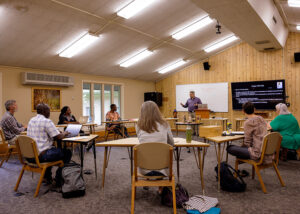Life is never static. As I transition from eleven years of leadership with Mennonite Church Canada into a season of semi-retirement and new opportunities, I’m struck by the parallels between the endemic and essential aspects of change in personal life and in church life.
In fond farewell, I offer a few reflections on change for the church.
Much of this change is incremental as the church and its leaders adapt their worship and ministry to the tides of change upon which we sail. But in our time, prominent voices also issue an insistent call for the church to engage change of monumental proportions. Books like Everything Must Change: Jesus, Global Crises, and a Revolution of Hope (Brian McLaren) and Why Christianity must Change or Die (John Shelby Spong) capture the spirit of the age with their urgent, attention-grabbing call for the church to embrace major changes. Mennonite Church Canada’s own Future Directions Task Force is, in part, a response to the cultural and societal dynamics that have prompted these, and many other change-focused books.
The temptation of those who identify the need to change and who often assist in leading a change process is to “damn the torpedoes” and forge ahead, viewing those who resist change simply as obstacles to overcome, or even to cast aside. In an article for the Congregational Consulting Group entitled Valuing our “Agents of Stability,” David Brubaker reminds us that congregational reality includes both “agents of change” and “agents of stability.” And successful agents of change must “learn to work with agents of stability rather than against them.”
Agents of stability tend to be those who know the story of the congregation, who are intimately familiar with, and deeply grounded in, the “angel” of the congregation. They know what is precious and core to the life of the faith community, and will rightly resist efforts at change that fail to recognize or worse, actively dismantle, what they know to be foundational.
Wise leaders and healthy congregations, writes David Brubaker, “display a delightful balance and mutual respect between the ‘agents of change’ and the ‘agents of stability.’” In a time when many congregations, as well as the wider church, are preoccupied with the awareness that change is both needed and unavoidable, we do well to bear this wisdom in mind. It is as important for congregations and the wider church to reclaim and articulate what continues to ground and form us, as it is to dream together of the shape of the new things that the Holy Spirit is inviting us to be a part of. Neither should be neglected. Both must be tended, articulated and pursued.
As our Mennonite Church Canada family, with its congregations and area churches, collectively navigates its own seas of change, I hope and pray that those who guide and those who engage in this process will do so wisely and circumspectly. May we all be attentive to the voice of the Spirit whose wind blows the church—and our own lives—in ways we can barely begin to imagine.
Dave Bergen is the retiring executive minister of formation and chief administrative officer of Mennonite Church Canada.
See also: “Frank thoughts on future directions”






Leave a Reply
You must be logged in to post a comment.